Companies and institutions need to provide online training on a daily basis and are faced with the challenge of not knowing which are the best e-learning platforms.
And it’s no wonder. In fact, if we search the internet for a platform to create online courses, we can spend hours lost among dozens of results and, what’s more, we would be putting the cart before the horse. That’s not the search we should be doing first, as it will be impossible to decide by consulting comparisons if other aspects are not clear beforehand, such as the business profile, how we plan to use it, how much we are going to get involved and how we would like it to work.
In this post, we will guide you so that you can find “your best e-learning platform” which, at the end of the day, will be the one that suits your specific needs.
We know for sure that power, storage capacity, technical support and ease of use are attributes that any platform worth its salt must have. From there on up.
But that is another matter. We cannot talk about features without first knowing what type suits us, and that will depend on how we are going to use it.
How are you going to use the platform?
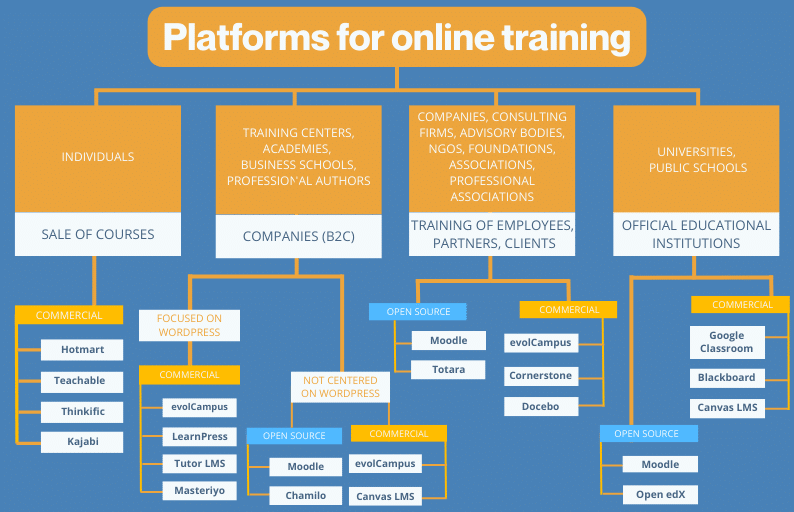
Best e-learning platforms: open source or commercial?
If you are just starting out and only plan to offer courses occasionally, a marketplace platform could be the best option. Mainly because you can delegate everything to it (website, marketing, and LMS).
However, if you are going to offer courses on a regular basis, whether to clients, companies or third parties, or if you intend to make online teaching a central part of your business, an e-learning platform or LMS platform should be your first choice. This is mainly because it will allow you to create, manage and control the entire online training process.
But when choosing an LMS platform, you need to take into account the specific needs and context of those who will be using it.
For example, it is not the same if you are a university as if you are an organisation that wants to train hundreds of employees. You will need a platform focused on your sector and purpose. Similarly, if you are an academy that sells online courses and already have your website and everything centralised in WordPress, your requirements will be different from those of another academy that does not have these structures and, in most cases, the platform will also be different.
To know where to aim, consider your needs and resources. This will allow you to filter through the best open source or commercial e-learning platforms (the misnamed free or paid ones).
Keep in mind that with the former, you can do almost anything, as they allow for a great deal of customisation. If that is what concerns you and you lean towards these, you will have to decide between installing, managing and maintaining the platform internally, considering the technical complexity and delays, or hiring a third party to do it, with the associated costs.
On the other hand, commercial platforms are what you see; they come ready-made and you don’t have to complicate your life with developments. In other words, they are all-inclusive, turnkey solutions that are ready to use immediately, some of which are even AI-powered e-learning platforms.
Whatever your preference, don’t forget that behind the best e-learning platforms there must always be an experienced provider that offers good support in your language and allows you to try it out before you sign up.
The 10 best e-learning platforms: your guide for 2025

Below, we show you our selection of the best e-learning platforms. All of them have the basic tools required for e-learning, although they vary in depth and scope.
Later on, we will offer additional recommendations based on your profile.
Let’s get down to business! Let’s see what they are.
evolCampus
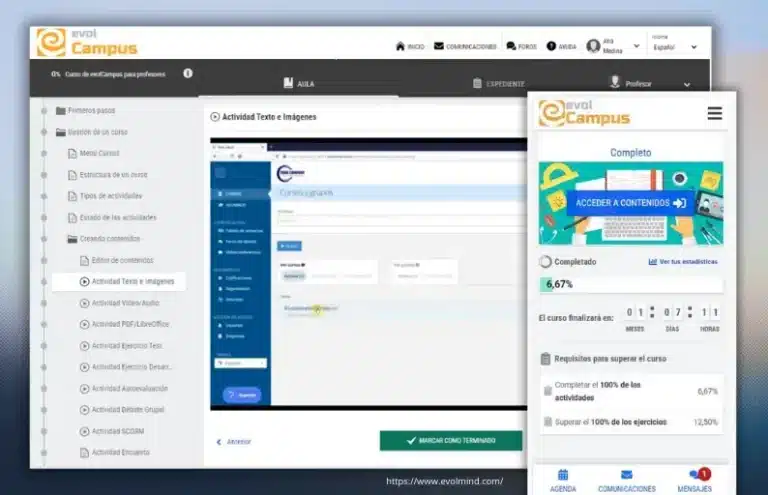
The evolCampus e-learning platform is a commercial cloud platform that is ready to deliver online training in a matter of seconds.
This all-in-one solution has become a benchmark in remote and hybrid learning for thousands of companies and training centres in 35 countries, significantly reducing the effort and investment required for its implementation and use.
Positive aspects:
- Immediate operation: recommended for developing e-learning without delay.
- Fast migrations from different platforms.
- Agile and reliable technical support.
- Scalable to large volumes of users.
- Agile course creation and use.
- APP available (in addition to being accessible via the web from any device).
Negative aspects:
- As it is closed source, it does not allow for customised development.
For whom:
- Educational institutions, such as academies, training centres and business schools.
- Organisations: consultancies and advisory firms, companies, foundations, NGOs, associations and professional bodies.
- Professional authors.
Price:
- Free trial with expert consultants.
- Competitive and flexible pricing,, based on the number of students per month.
Price:
- evolCampus has an overall rating of 4.7 out of 5 on Capterra.
Moodle
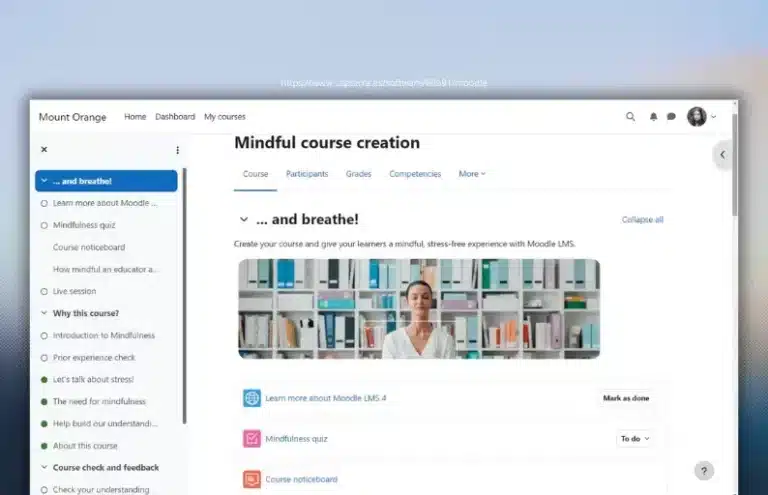
Moodle is the world’s best-known and most widely used open-source learning management system.
It has a network of certified partners authorised to provide support and services related to its implementation and use.
Positive aspects:
- High degree of customisation.
- Scalable.
- Total features: 118.
- Thousands of plugins, including e-learning with artificial intelligence, to improve and expand the capabilities of the LMS.
- Mobile app available.
- Large user community.
Negative aspects:
- Requires technical knowledge and can be complex or difficult to manage.
- Lacks official technical support.
For whom:
- Official academic institutions, such as universities and public schools, with technical resources.
- Organisations: companies, consultancies, NGOs, professional associations.
Price:
- No free trial or demo available.
- Free*
User rating:
- Moodle has an overall rating of 4.3 out of 5 on Capterra.
Chamilo
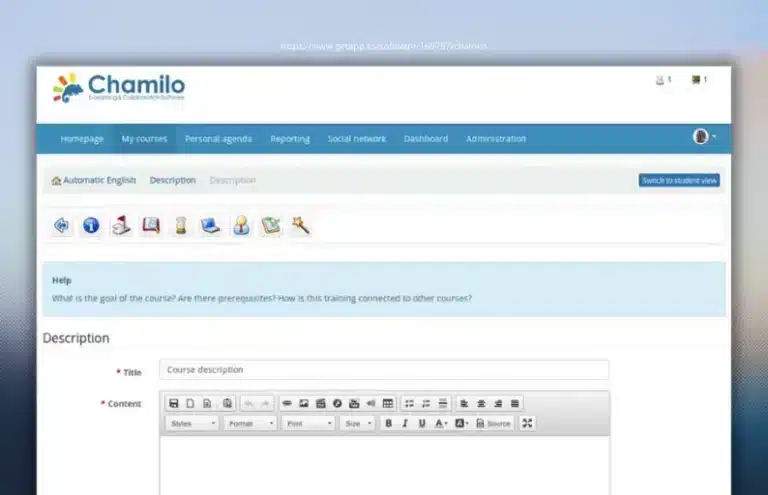
Like Moodle, Chamilo is an open-source LMS with a strong presence in the corporate world. It currently has over 21 million users worldwide.
Positive aspects:
- Customisable. Allows plugins to be installed from the platform itself.
- Simplified user experience.
- Flexibility to choose between own hosting or external hosting services.
- Total features: 31.
- Wiki tool for collaborative work.
- Official Chamilo providers contribute to development by providing patches and plugins.
- Monthly “Chamitalks” to learn from experts.
Negative aspects:
- It lacks technical support beyond the community (which is small compared to other top open-source e-learning platforms).
- In 2023, the number of security vulnerabilities discovered in its code has increased.
For whom:
- Educational institutions, such as academies, training centres, business schools, colleges and universities.
- To a lesser extent, companies (biopharmaceutical), NGOs and government institutions.
Price:
- Free trial.
- Free*
User rating:
- Chamilo has an overall rating of 4.7 out of 5 on Capterra.
Totara LMS

Among Totara‘s solutions is Totara Learn, an open-source LMS that can be easily adapted to the needs of businesses.
So much so that it provides other complementary products for performance management, professional development, and collaboration.
Positive aspects:
- Based on Moodle, with additional features for learning management.
- Highly customisable and scalable.
- Total features: 49.
- Badges to motivate student achievement.
- Mobile app available.
Negative aspects:
- The learning curve may be steep for some users.
For whom:
- Organisations: large companies, non-profit organisations.
- Administrations.
Price:
- It does not offer a free trial, only a demo scheduled with a partner.
- Although it is open-source software, it is not free. Prices are not displayed on its website.
User rating:
- Totara has an overall rating of 4.4 out of 5 on Capterra.
Cornerstone LMS
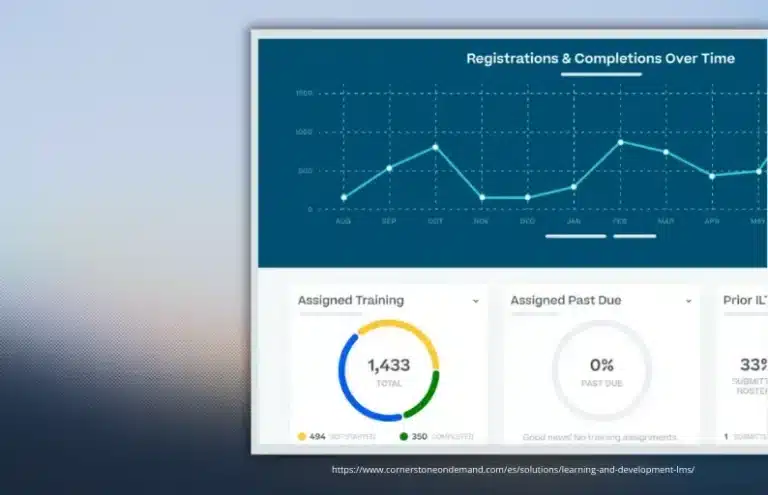
Cornerstone LMS is a commercial platform with a strong focus on businesses and a solid presence in the United States and the United Kingdom.
Its Talent Experience Platform (TXP) merges the LMS and LXP platforms, focusing on driving business, talent management strategy and results.
Positive aspects:
- Highly scalable.
- Focus on skills and abilities development.
- Personalised development plans.
- Total features: 82.
- Good technical support and a global community of over 6,000 members.
Negative aspects:
- Steep learning curve.
- High price.
For whom:
- Organisations: consulting and advisory firms, medium-sized and large companies, foundations, NGOs, associations and professional bodies.
Price:
- No free trial is offered, but you can schedule a demo.
- Pricing structure is tiered according to needs and additional costs associated with installation, customisation, maintenance, etc. You must contact the company for this information.
User rating:
- Cornerstone has an overall rating of 4.3 out of 5 on Capterra.
Docebo
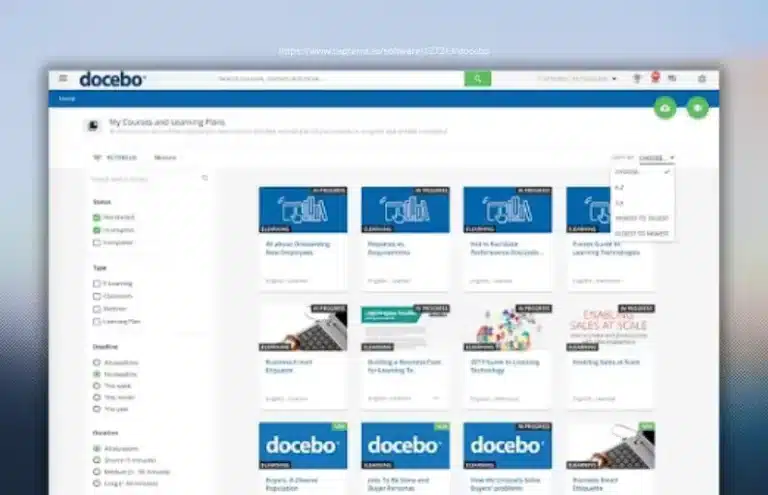
Without a doubt, Docebo is also among the best e-learning platforms.
This time, we find a SaaS commercial for corporate training with a great reputation in the US market.
Positive aspects:
- Powerful and scalable.
- Total features: 85.
- Uses AI algorithms to ensure more immersive experiences.
- Gamification: badges, prizes, rewards.
Negative aspects:
- Quite complicated interface. Requires technical knowledge.
- Expensive for small businesses.
For whom:
- Organisations: companies of any size.
Price:
- There is no free trial. A demonstration can be scheduled to see it in action.
- Prices are scalable and provided upon request.
User rating:
- Docebo has an overall rating of 4.3 out of 5 on Capterra.
Open edX
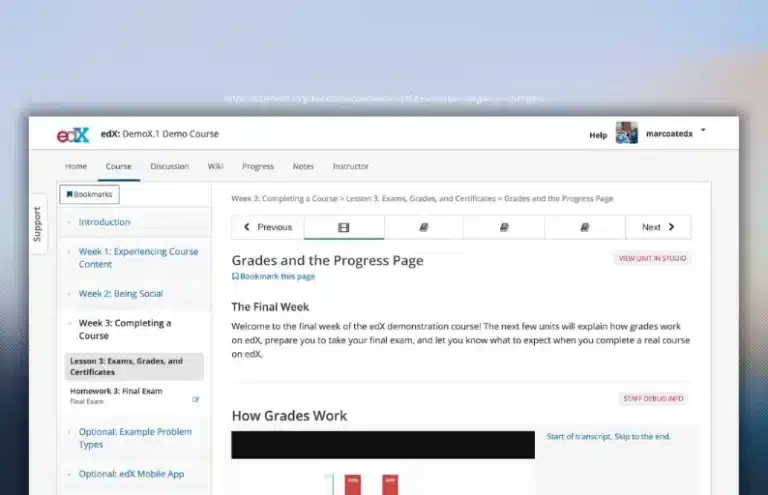
Open edX is an open-source LMS co-founded in 2012 by Harvard University and the Massachusetts Institute of Technology (MIT).
Despite being relatively young, it has positioned itself as an alternative to Moodle for educational institutions around the world.
Positive aspects:
- Customisable.
- Scalable to a large number of students.
- Simple interface.
- Total features: 20.
- Suitable for massive open online courses (MOOCs).
- Proprietary gamification module.
- The Open edX team organises monthly meetings with EdTech experts to get the most out of the tool.
Negative aspects:
- The initial setup can be complex and require technical skills.
- It lacks support, unless you contract the service managed by an external provider. However, there is a large community behind it and it provides a chat channel on Slack.
For whom:
- Official academic institutions, such as universities and public schools.
- Organisations: companies, NGOs.
- Government institutions.
Price:
- Managed service: 30-day trial with no obligation and trial. Monthly subscription pricing models.
- If used on a self-managed basis, it is free of charge*.
User rating:
- Open edX has an overall rating of 4.8 out of 5 on Capterra.
Google Classroom

As expected, we suggest Google’s tool, which, although not a typical LMS, as it is somewhat limited in terms of features, is a good option to complement face-to-face training or blended learning.
Google Classroom is included in the Google Workspace for Education package.
Positive aspects:
- Works in the cloud.
- Easy course creation and use.
- Total features: 39.
- Easy integration with other Google services.
- Mobile app available.
Negative aspects:
- Support only through the Classroom help centre and the Google Classroom community.
- Fewer advanced features compared to other platforms.
For whom:
- Official educational institutions, such as universities, schools, and centres that use Google Workspace for Education.
- Organisations: training companies and NGOs.
Price:
- Free version for teachers and eligible educational institutions (those that meet the eligibility requirements established by Google).
- All other subscriptions are paid (Education Standard, Teaching and Learning Upgrade, and Education Plus). Free trial available.
User rating:
- Google Classroom has an overall rating of 4.6 out of 5 on Capterra.
Blackboard Learn
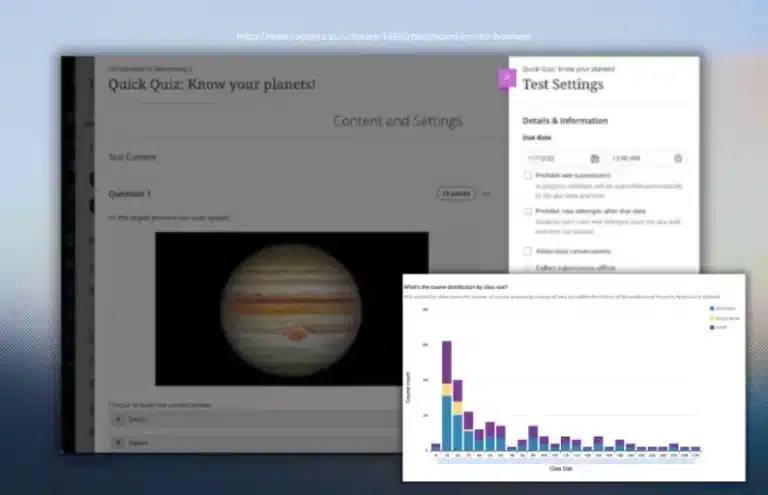
Logically, Blackboard Learn is another of the best commercial e-learning platforms for university education.
Its improved version, Blackboard Learn Ultra, is more user-friendly, offers new features and is optimised for mobile devices.
Positive aspects:
- Very robust platform, no errors or problems.
- Scalable to large volumes of users.
- Total features: 72.
- AI design assistant.
- Built-in originality feature to prevent plagiarism.
- Mobile app available.
- Consulting and support services.
Negative aspects:
- Its elegant interface may not be as intuitive as promised and may require technical knowledge.
- Very high price.
For whom:
- Large official educational institutions, such as universities and public schools.
- Organisations: corporate and governmental.
Price:
- No free trial is offered, but it is possible to request a demo.
- High prices. To obtain a quote, you must contact Blackboard.
User rating:
- Blackboard has an overall rating of 4.7 stars out of 5 on Capterra.
Canvas LMS (Instructure)
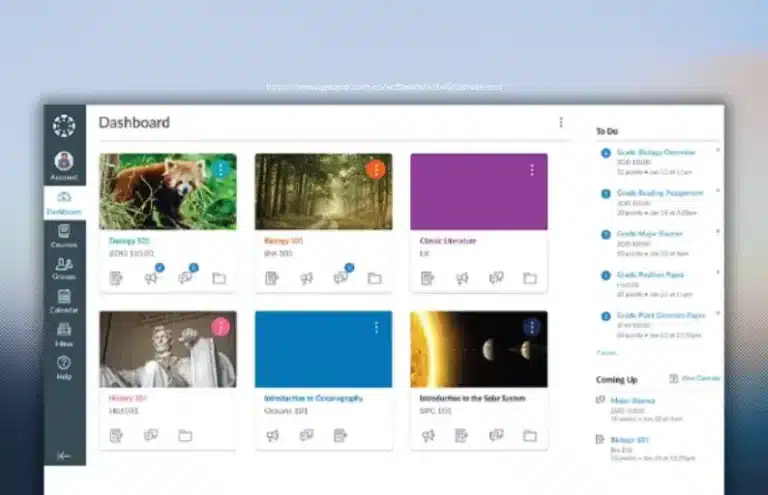
We conclude the ranking with the flagship solution from the American company Instructure.
Specifically, Canvas LMS is a platform used by hundreds of universities, colleges, and school districts.
It is available in two different versions: an open-source version for institutions with technical capabilities, and a commercial version that is ready to use without having to deal with technical or implementation details.
Positive aspects:
- Attractive and user-friendly design.
- Customisable (open source version).
- Canvas Catalog content and learning resource repository (commercial version).
- Total features: 106 (commercial version).
- Canvas Mobile app. Native Canvas mobile apps have limitations and do not offer all of its features.
- User community with over two million members.
Negative aspects:
- Initial learning curve.
- Advanced features subject to additional costs.
For whom:
- Official academic institutions, such as universities and public schools.
Price:
- Free Trial and Demo (commercial version).
- Free Version*
- Commercial version with subscription-based pricing model.
User rating:
- Canva LMS has an overall rating of 4.5 out of 5 on Capterra.
New trends for 2025 in e-learning platforms

Every year, trends emerge in the world of online training and learning that lead to the integration of new features into e-learning platforms. Some have remained popular in recent years, such as gamification, microlearning and mobile learning, while others are gaining ground in response to the needs and new realities of the sector.
- Personalisation of learning
E-learning with artificial intelligence is here to stay, offering many benefits and applications. On the one hand, there is personalised learning, as e-learning platforms with AI extract information from students, analyse their strengths and weaknesses, and adapt the course content to suit them optimally. Thus, both the resources and the objectives are tailored to the needs and pace of the students.
- Automation of student tracking
In online training, repetitive tasks are often the most time-consuming. Artificial intelligence e-learning is also helping LMS platforms improve their times. For example, when it comes to student monitoring, integrating the dashboard and a virtual tutor. All these aids allow teachers and tutors to devote their time to what they can really contribute quality to.
- Immersive learning
Immersive learning is revolutionising online training. Virtual reality (VR) and augmented reality (AR) are also two technologies that we will have to get used to. The way we learn is becoming increasingly practical and interactive, and students will gradually demand more dynamic and entertaining learning experiences. In addition to being an attractive way to learn, it will allow them to apply what they have learned to almost real-life situations, from a safe environment.
Recommendations: best e-learning platforms according to profile

- Are you an individual interested in selling online courses?
- Are you a company that provides training to third parties or an individual with a considerable turnover and want to become more professional?
- Open source: Moodle or Chamilo.
- Commercial: Canvas LMS, evolCampus, Learnpress, Tutor LMS or Masteriyo. (If you have everything centralised in WordPress, consider the last four).
- Are you a company that wants to train employees, partners or customers?
We are referring to consulting firms or advisory services that offer training to companies of any kind, typically with more than 50 employees and/or a wide geographical distribution, foundations, NGOs, associations, and professional bodies.
If you belong to this group, try these LMSs:
- Open source: Moodle or Totara.
- Commercial: evolCampus, Cornerstone or Docebo.
- Are you an official academic institution?
- Open source: Moodle or Open edX.
- Commercial: Google Classroom, Blackboard, or Canvas LMS.
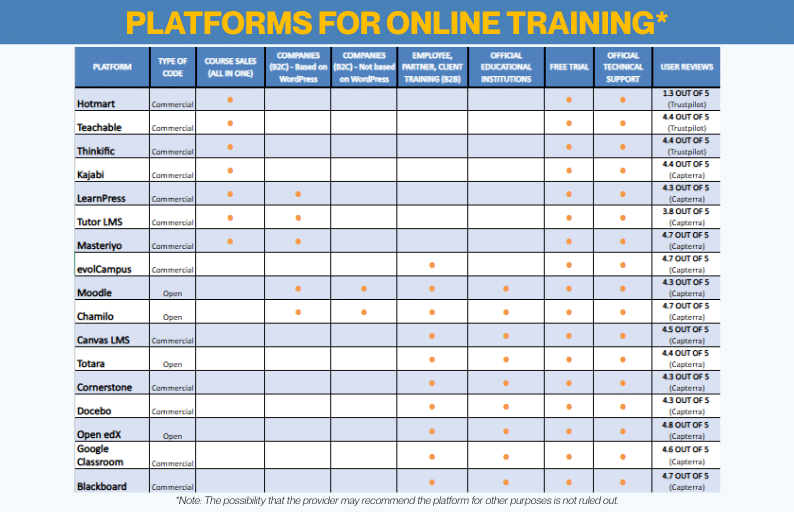
One final tip for choosing “the perfect one” among the best e-learning platforms
We must point out that there is no single e-learning platform that suits everyone, as it will depend on the needs of the organisation, institution or project in question.
It is true that there are minimum requirements in terms of the characteristics of the e-learning platform, as we mentioned at the beginning, such as security, maintenance, support, ease of use and power. The rest of the services to look for will vary.
For example, we know that for companies or consultancies, profitability in relation to subsidised training, agility in transferring workers to the workplace, and the ability to create courses and customise the campus according to their clients are relevant issues.
However, an academy or training centre may place more emphasis on other aspects, such as student enrolment via its website, ease of use, communication and monitoring tools, or the ability to award secure diplomas.
As you can see, what may be more significant for one entity may be less so for another.
Therefore, once you know where to go and proceed to evaluate the platforms, never put your profile and “real” demands on the back burner. Don’t lose sight of details such as how you plan to administer it, your training management strategy, or the number of students and courses you aspire to have.
We have clients who initially opted for certain platforms solely because of their popularity, but ultimately found them too complex, demanding too much effort, and offering more features than they needed. Then we have seen others who also made the wrong choice because they opted for the most basic platforms, which fell short of their needs.
Look for one that offers what you really need, and make sure the provider works with clients similar to your project, inspires confidence, and has first-hand knowledge of the sector.
Our advice is to start by evaluating the best commercial e-learning platforms, as they are quick to implement, ready to use and avoid unpleasant surprises.
Of course, if you find that these do not suit your needs, you could explore open source platforms. However, bear in mind that in order to customise them to your liking, you will need to invest in them.
